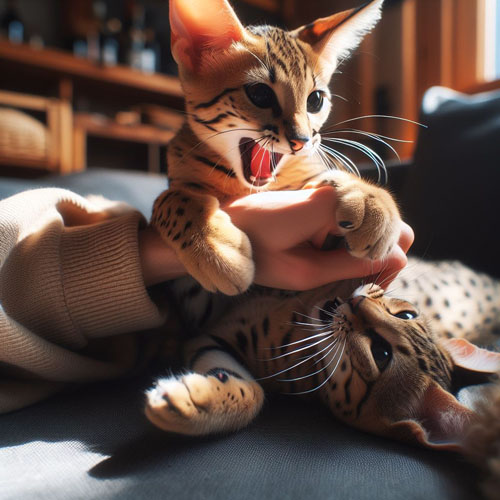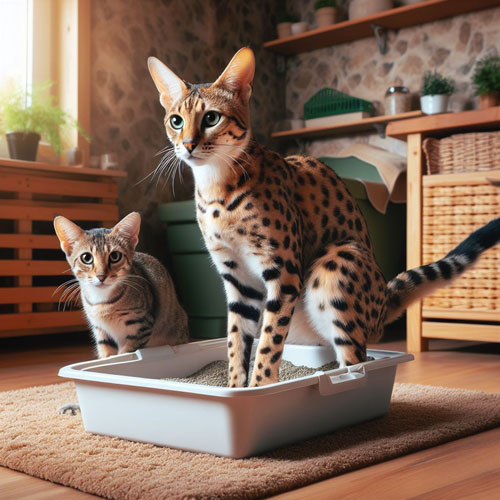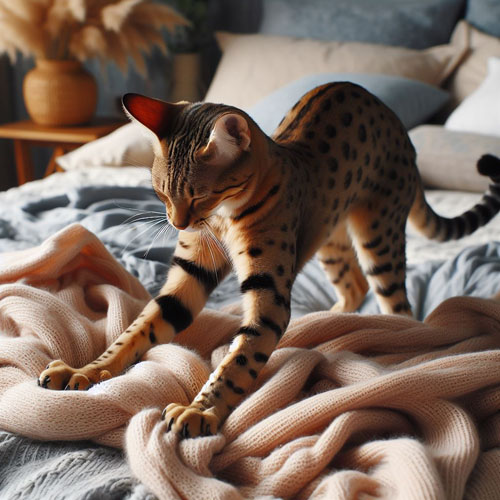Litter Box Woes: Understanding and Addressing Feline Stress and Anxiety
Cats are known for their cleanliness and meticulous grooming habits. As responsible pet owners, it is our duty to provide them with a safe and hygienic environment that includes a proper litter box. However, sometimes our feline friends may develop behavioral issues, causing them to pee outside the litter box. One common reason for this problem is stress and anxiety.
Stress and anxiety can affect cats just as it does humans. They may experience these emotions due to various factors such as changes in their environment, physical discomfort, or even the presence of other animals. Female Savannah cats are no exception to this, and they are particularly susceptible to such issues.
When a female Savannah cat starts peeing outside of her litter box, it is crucial to identify the root cause of her stress and anxiety. Here are some common triggers that may be affecting your beloved feline friend:
- Environmental changes: Cats are creatures of habit, and any alterations to their familiar surroundings can trigger stress. Moving to a new home, remodeling, or even rearranging furniture can disrupt their sense of security, leading to behavioral problems.
- Health issues: Physical discomfort, such as urinary tract infections or kidney problems, can cause a cat to associate the litter box with pain, leading to avoidance behavior.
- Multi-cat household: If you have multiple cats, conflicts and competition for resources, including the litter box, can create stress and anxiety.
- Lack of stimulation: Cats are active animals that need mental and physical stimulation. Boredom and a lack of environmental enrichment can contribute to stress, leading to inappropriate elimination.
Once the underlying cause of your female Savannah cat’s stress and anxiety has been identified, it is essential to take the necessary steps to address the issue. Here are some measures you can take:
- Provide a calm and secure environment: Minimize changes to your cat’s surroundings and establish a routine to help her feel safe and secure. Create a designated area where she can retreat and relax when feeling stressed.
- Consult a veterinarian: If you suspect that your cat’s litter box issue is due to a health problem, consult a veterinarian for a thorough examination and appropriate treatment.
- Maintain a clean litter box: Cats are naturally clean animals, and a dirty litter box can deter them from using it. Scoop the litter box daily and change the litter regularly to ensure cleanliness.
- Adequate litter box management: If you have multiple cats, provide a litter box for each feline, plus an additional one. This will minimize conflicts and ensure that each cat has access to a litter box when needed.
- Environmental enrichment: Engage your cat in interactive play sessions and provide toys and scratching posts to keep her mentally stimulated. Consider introducing puzzle feeders or hiding treats around the house to provide mental challenges.
- Feline pheromone products: Feliway, a synthetic feline facial pheromone, can help create a calming environment for your stressed cat. It is available in diffusers, sprays, and wipes and can aid in reducing anxiety-related behaviors.
In conclusion, when dealing with a female Savannah cat peeing outside of her litter box due to stress and anxiety, understanding the underlying triggers and implementing appropriate measures can help alleviate the problem. By providing a calm and secure environment, addressing any health issues, and ensuring proper litter box management, you can help your feline companion regain her litter box manners and overall well-being. Remember, patience and consistency are key when dealing with feline behavioral issues.





